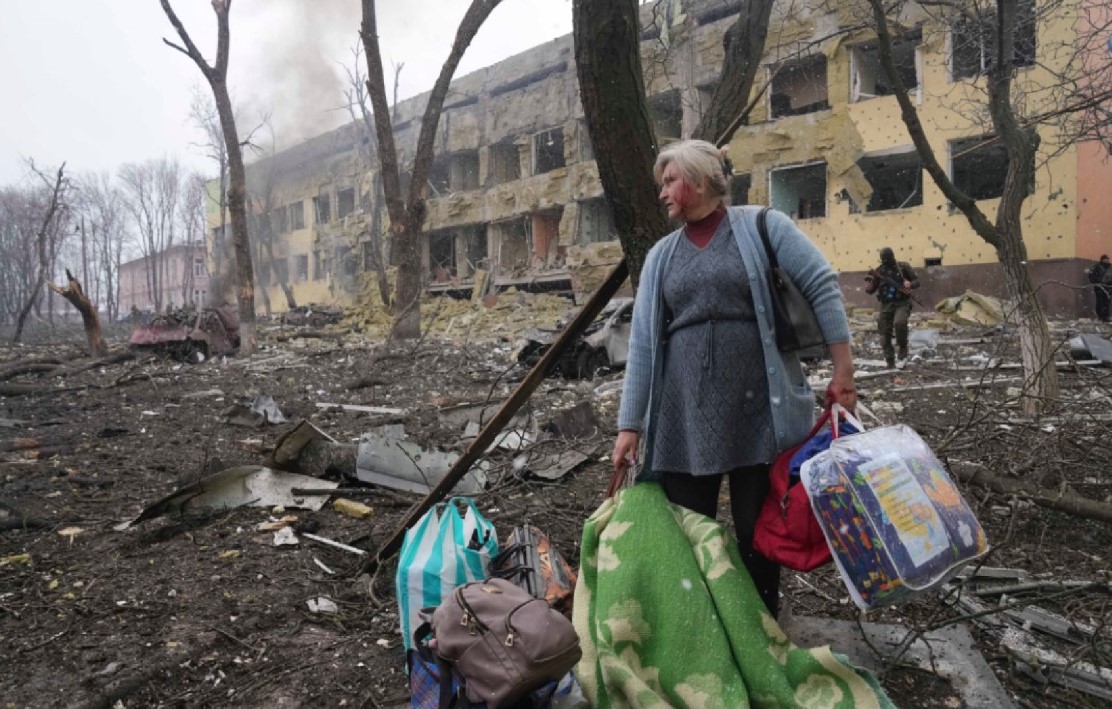Major report on Russia’s devastation of Mariupol demands that Putin and military leaders are held to answer

A report just published by Human Rights Watch, together with the Ukrainian NGO Truth Hounds and SITU Research, has investigated the “story of horror” presented by Russia’s attack on Mariupol. The authors identify ten key figures, including Russian president Vladimir Putin, who should be held to account for war crimes committed by Russian and Russian-controlled military during the assault on Mariupol. The study is particularly valuable in exposing Russia’s attempts to conceal its crimes and, through its documentation of the facts, rendering them futile. It comes as the aggressor state has concocted almost 300 ‘trials’ and horrific sentences against Ukrainian prisoners of war, aimed, it would seem, at blaming defenders of Mariupol and other Ukrainian cities of the Russian invaders’ crimes.
The research carried out by the authors of “Our City Was Gone” Russia’s Devastation of Mariupol included interviews of 240 people, mostly displaced Mariupol residents. They also analysed dozens of satellite images and over 850 photos and videos. Such testimony is vital, especially given the efforts made by Russia’s FSB to pressurize Ukrainians forcibly deported to Russia or occupied Crimea into accusing Ukrainian defenders of some of Russia’s most egregious crimes, like the bombing of a maternity hospital on 9 March 2022, or of the Mariupol Drama Theatre, which was being used as a bomb shelter, just days later, on 16 March. A number of Russians have also been sentenced to long terms of imprisonment for posting truthful information about Russian crimes in Mariupol or other cities under attack or occupation. Maria Ponomarenko, a journalist and human rights activist was sentenced to six years for a post on Telegram about the bombing of the Drama Theatre.
Russia’s relentless assault on the city left civilians without access to critical infrastructure and and forced to face being shot or bombed as they tried to get food or water. Russia also blocked the city and obstructed both official evacuations, and the delivery of humanitarian aid. “By mid-April, when Russian forces had almost full control of the city, thousands of civilians were dead and thousands of buildings, including high-rise apartments, hospitals, and schools, were damaged or lay in ruins. An estimated 400,000 residents had fled the city by mid-May, but those remaining were left for months without basic services, including electricity, running water, and health care.” In 14 case studies, involving 18 locations in Mariupol that came under Russian attack, the authors found either no evidence of Ukrainian military presence near the building that was struck, or only limited military presence, making the attack unlawfully disproportionate.
Their assessment that at least eight thousand people died of war-related causes between March 2022 and February 2023 is based solely on their study of satellite and other footage from city cemeteries is “likely a significant underestimation of the total number of dead.”
While clearing debris and demolishing unsafe structures are warranted, the report notes that Russia has prevented independent human rights investigators, forensic exports, etc. from examining damaged buildings. In so doing, “Russia effectively erased the physical evidence at hundreds of potential crime scenes across the city.” As reported here, the Mariupol City Council reported towards the end of 2022 that Russia was concealing and demolishing the Drama Theatre, with this potentially hiding the bodies of many hundreds of victims of the two huge bombs dropped on a building known to be sheltering civilians, and which had the word CHILDREN in Russian written in huge letters in front and at the back of the building.
Apparent violations of international humanitarian law included “deliberate or indiscriminate air and ground attacks on civilian objects, including on a hospital, that killed and injured numerous civilians; an apparently unlawful strike hitting part of the electricity infrastructure; the apparent blocking of civilian evacuations and the arbitrary denial of humanitarian aid; and the forced transfers of Ukrainian citizens to Russia and Russian-occupied territory.”
“Many of the unlawful strikes on Mariupol civilian structures may amount to war crimes, including the attack on the Mariupol Drama Theatre. The forced deportations of Ukrainians to Russia and forced transfers to other areas occupied by Russia is also a war crime and a potential crime against humanity. War crimes investigations are needed with respect to other attacks on civilian buildings and critical infrastructure, and the blocking of humanitarian aid and evacuations of Ukrainian civilians.”
The report documents in detail the testimony of residents and volunteers who risked death each time they tried to reach one of the few vital sources of water in the besieged city. “The volunteers organizing the distribution, the water tanks themselves, and the residents braving the city streets to reach the wells or distribution points to then queue up for up to six hours, were exposed to barrages of shelling, rockets, and air-dropped munitions.” Other crimes discussed include attacks on hospitals, other critical infrastructure; Russia’s so-called ‘filtration’; the blocking of safe routes out of Mariupol to government-controlled Ukraine and the forced transfer of children and other civilians to Russia.
The authors identify those individuals who likely bear command responsibility or were, themselves, directly involved in war crimes or other abuses in Mariupol. The list includes Vladimir Putin; defence minister Sergei Shoigu and 8 other senior commanders. “These individuals, and potentially other commanders of the 17 units identified in Mariupol, should be investigated and appropriately prosecuted for their alleged role in serious violations committed during the Russian forces’ assault. Reparations should also be paid to the victims and their families.
The report can be downloaded here





